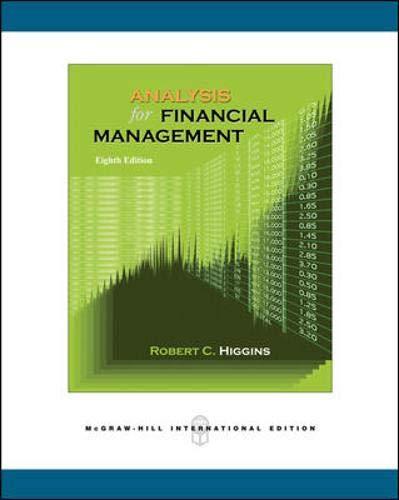Montgomery Corporation 107 the last six years, even though their net income may have declined significantly. Furthermore, the whole argument is meaningless, anyway, because the dividend is not really competing with the capital budget for funds-we don't turn away profitable projects in favor of paying the dividend. If there are worthy projects in which we want to invest, and we would rather use our available cash to pay the dividend, then we seek financing for the investments from outside sources. In a way, we can have our cake an d eat it too." She chuckled, pleased at the analogy. Don Jackson, however, was not to be intimidated so easily. "Yes, ma am what you say is true," he replied, "and I would respond that competitors are not treating their stockholders fairly, either. Furthermore, you do seek outside financing occasionally for large projects, but there are two problems associated with doing it routinely, as you suggest. First, it might be viewed as borrowing, or issuing stock, to pay the dividend, which would cast the company in a very poor light. Second, it's more expensive to finance from outside sources than from inside due to the fees charged by the investment banker. Therefore, I believe you should exhaust our inside sources of financing before turning to the outside, Ms. Reynolds held her ground. "That's all very well, but it's still not necessary to cut the dividend in order to fund the capital budget. As a last resort, if the company's cash balances were about to be drawn down too low, we could always declare a stock dividend instead of a cash dividend." Ladies, gentlemen, "Mr. Edward Asking, the chairman, intervened, "your comments are all very perceptive, but we must move on to the business at hand. All those in favor of changing to a residual policy, please raise your hand." Montgomery Corporation 107 the last six years, even though their net income may have declined significantly. Furthermore, the whole argument is meaningless, anyway, because the dividend is not really competing with the capital budget for funds-we don't turn away profitable projects in favor of paying the dividend. If there are worthy projects in which we want to invest, and we would rather use our available cash to pay the dividend, then we seek financing for the investments from outside sources. In a way, we can have our cake an d eat it too." She chuckled, pleased at the analogy. Don Jackson, however, was not to be intimidated so easily. "Yes, ma am what you say is true," he replied, "and I would respond that competitors are not treating their stockholders fairly, either. Furthermore, you do seek outside financing occasionally for large projects, but there are two problems associated with doing it routinely, as you suggest. First, it might be viewed as borrowing, or issuing stock, to pay the dividend, which would cast the company in a very poor light. Second, it's more expensive to finance from outside sources than from inside due to the fees charged by the investment banker. Therefore, I believe you should exhaust our inside sources of financing before turning to the outside, Ms. Reynolds held her ground. "That's all very well, but it's still not necessary to cut the dividend in order to fund the capital budget. As a last resort, if the company's cash balances were about to be drawn down too low, we could always declare a stock dividend instead of a cash dividend." Ladies, gentlemen, "Mr. Edward Asking, the chairman, intervened, "your comments are all very perceptive, but we must move on to the business at hand. All those in favor of changing to a residual policy, please raise your hand












